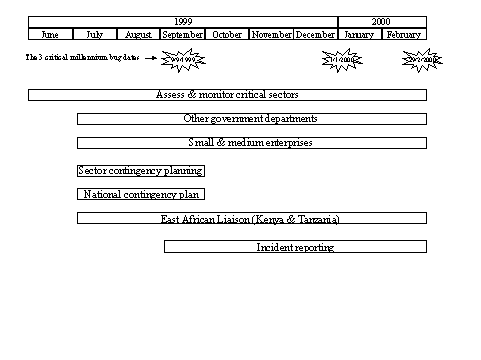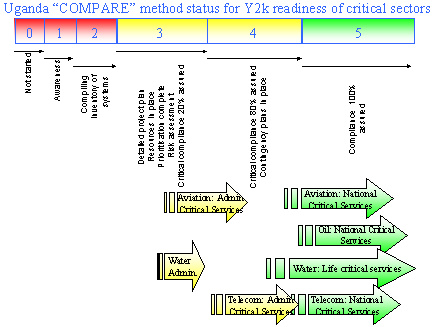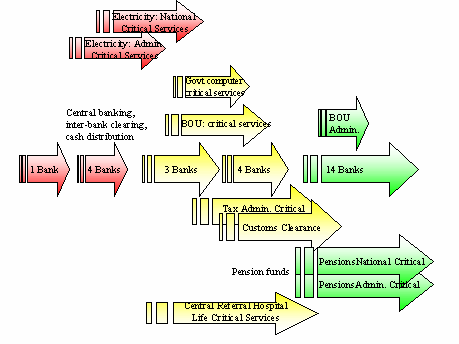

REPUBLIC OF UGANDA
MINISTRY OF FINANCE, PLANNING,
AND ECONOMIC DEVELOPMENT
NATIONAL Y2k TASK FORCE
P. O. BOX 5828, KAMPALA, UGANDA
Uganda National Y2k Task Force
End-June 1999 Public Position Statement
Web:
www.y2kuganda.go.ugEmail:
y2kntf@infocom.co.ugPost: National Y2k Task Force,
PO Box 5828,
Kampala
Tel: +256 (0)41 340181
Fax: +256 (0)41 340180
The Problem
There are 3 major dates that have been predicted to cause problems with old computer systems:
Other dates may have significance, especially where forward date processing (e.g. setting budgets for the next financial year) may cause earlier failure than September.
Certain sectors (e.g. telephone communications) are critical to the support of many other organisations - the failure of one critical organisation to provide an important service, even for the period of a day or so could cost the economy a great deal. This report, therefore, examines the status of the plans and the actual Y2k remediation work that has been completed within these sectors.
Summary
We have carried out on-site assessments of the most critical socio-economic sectors of Uganda.
As a result of the National Y2k Task Force vigilance, we believe that our vision of 'life as normal' during the millennium date changes will be attained in Uganda.
We highlight Uganda Electricity Board in particular as lagging in planning and remediating Y2k bugs in their National Critical systems and Admin Critical systems. Therefore for the moment we have allocated UEB as "RED" status. However, we believe that since we made our assessment the top management actions that are now underway will address the critical issues.
A number of other sectors are in "YELLOW" status since they are planning to upgrade their systems in the near future and we expect to report on progress when we revisit these organisations and others for our next report due mid-August.
Background
National
The National Infrastructure is the collective term used to describe the essential services upon which Uganda relies - from power supplies, telecommunications and finance to transport, emergency services and healthcare.
For the last few years, millions of shillings and thousands of work hours have been committed to ensuring that the Ugandan citizenry will experience no material disruption in any of these services, as a result of the Millennium Bug.
With less than six months to go until the date change, this National Y2k Task Force report has been compiled from detailed assessments carried out in June. Its purpose is to indicate the current state of readiness of our essential services.
The report shows each sector as a whole, not the status of individual companies within that sector. It details the progress of sectors in their preparations towards achieving 'Green' status.
East African Region
Several working parties have met under the auspices of the Commission For East African Co-operation to ensure that cross-border risks have been assessed, and equipment that one country knows will fail is identified to the ot her countries so that remediation is co-ordinated well in advance of the date change.
The National Y2k Task Force will be charting the progress in future Reports.
National Y2k Task Force Plans

Status Overview
What organisations have been assessed?
For this initial report we have concentrated on the critical organisations. The results can be seen in the diagram overleaf. Each economic sector is shown as an arrow, leading from Level zero (complete lack of planning) th rough to level 5 (nearly 100% complete).
With less than 6 months to go until the date change to 2000 occurs one would expect the great majority of organisations to have well advanced preparations in place, and the old computer systems replaced, and for the great majority of organisations in U ganda this is the case.
We have split the analysis for each sector into:
The status of most critical areas such as Telecommunications, Aviation, Oil supply and Water Sanitation are "Green". This means that the Y2k remediation work should be generally complete even before the first 'bug' date of 9/9/99.
Shouldn't all organisations be 100% ready now?
No. Many organisations are upgrading their systems in line with business requirements for their new financial years starting in July. There can be common sense reasons for replacing systems at particular times of the year, or phased with plans for reorganisation.
In our assessment of each organisation we have therefore not only taken into account their present level of readiness, but also how realistic their plans are for progress in the next few months. Generally speaking we would expect the pla ns to require all critical systems to be Y2k ready before the first possible failure date of 9/9/99.
Should I worry about the "RED" sectors?
No. Although electricity transmission and administration systems have been assessed as "Red" status, this is because the replacement of their non-compliant systems is planned for September. We regard this a risky approach for although the changes should be complete just before 9/9/99 there is neither room for slippage nor any margin for error.
We have worked with UEB to ensure that the board closely monitors their Y2k project, and that their suppliers have no doubt as to the milestones that they must achieve. We have met with the Managing Director of UEB to ensure that the necessary remedi al measures will be complete in good time. However, until remediation can be verified the "Red" status remains.
In comparison, more developed countries also have some sectors rated "RED". For example, in the United Kingdom recently reported that there were 3 sectors in England in the "RED" category (hospitals, fire services and police).
What about the "Yellow" sectors?
Several other organisations are marked as "Yellow" because they have not yet replaced their systems. However, they are doing so in their new financial year starting in July - and if everything goes according to their plans, we expect them to be "Green" by the end of July.
In comparison, the UK has still much work to complete in areas assessed as "YELLOW" in the UK. In the UK these include oil production, seaports and credit cards - sectors which do not exist in Uganda.
The Assessment


Notes On Progress Made
Civil Aviation
The Civil Aviation Authority has an on-going Year 2000 project with an action plan with various activities identified. The programme has a dedicated Y2K programme manager and reports to senior management.
The only Y2k problem is in the logging systems that may print out the wrong date information on history reports. Remediation is underway to fix this non-critical bug.
IATA audited the status of the Y2K programme at Entebbe onsite on behalf of IATA on the 17th-18th May 1999 and did not voice any urgent concerns to the CAA.
CAA sent out letters to air operators and/or aircraft registered in Uganda but received low response with no detail. The CAA sent out a statutory circular detailing the minimum Y2K assessment criteria to air operators with a June 30th 1999 d eadline for response. This information will be sent to ICAO.
The CAA and Entebbe airport in particular have full radio backup systems and completed contingency plans.
Electricity
In general the generation, transmission protection, communication, distribution and metering systems are at a good degree of readiness
However, we have assessed the critical segment of the transmission control systems, billing and accounting as "RED" status.
We have, as has been noted above, met with the Managing Director of UEB who understands our assessment. He will closely monitor the project plan and remediation of the systems.
Oil Supply
A detailed project plan exists and has been updated. Resources are in pace and remediation carried out. Risks have been assessed and critical compliance is assessed as at 95% assured.
The next stage is the development of detailed contingency plans for independent review
Telecommunications
Critical compliance is over 80% assured and contingency plans have been considered in detail but these need to be documented and independently reviewed.
Although project plans have not been kept updated as desired, this has not hindered the engineering progress being made on the majority of switches and transmission.
A date calculation problem would have occurred on 22nd August with the Earth/Satellite Geographical Position System (GPS) link. Therefore on the 9th June 1999 the software was upgraded and tested. NEC have now certified the Earth/ Satellite station as Y2k compliant, however, UTL are cautious and wish to carry out additional investigation on the Antenna Control Systems.
A contingency plan is being investigated for parallel international capacity expansion. This involves an Earth/Satellite link being investigated jointly with Celtel and MTN, the independent mobile telephone service companies.
The existing Wang billing is not Y2k compliant and urgently needs replacement. The contract has been placed to install a new system to read exchange data online and create bills direct. However, user training and implementation planning are on course f or installation to start in August, with the Wang computer being decommissioned thereafter.
Mobile Telephone Services
MTN and Celtel are private companies that have entered the Mobile telephone market with transmitters working around the Kampala/Central area of Uganda.
They will be assessed in a future report.
Water And Sewerage Disposal
An independent check is being carried out on embedded systems in water treatment, pumping and sewerage treatment plants. Contingency plans still need to be considered, documented and independently reviewed.
Inventory of all hardware and software is complete. The visit from the Y2k National Task Force earlier in the year helped identify the water treatment plant Programmable Logic Units (PLUs) as a potential cause of concern. After investigation, it has be en determined that these units are permanently switched over to manual operation. Investigations have not found any date dependencies in either automatic or manual modes of operation.
The disposal of sewerage is gravity fed, and so is not dependent on electricity supply.
There is no identifiable Y2k risk to National Water Supply and Sanitation above and beyond the normal operation service levels. However, a large degree of dependency exists on electricity supply from UEB for water pumping and sewerage treatment.
Central Bank
A detailed project plan exists and resources are in place, and all of the critical contracts have been placed on suppliers. However, the procurement process has slipped, thus critical compliance is assessed as at 62% assured, and should move to Green status shortly according to the plans.
Commercial Banking Sector
Bank of Uganda (BOU) has the mandate over the commercial banks and credit institutions as "Supervised Financial Institutions" (SFIs). BOU issued a public document entitled "BOU Year 2000 Policy/Guidelines for Commerc ial Banks and Credit Institutions" on the 11th March 1999. The document spelt the role of the BOU, banks and External Auditors.
BOU set out target dates and deadlines against which banks' Year 2000 compliance efforts are to be evaluated during independent assessment by BOU. BOU has set a 31st July 1999 deadline for banks to attain Year 2000 compliance. BOU has also s pelt out specific actions to be taken for the banks that are regarded as not adequately addressing the problem. BOU issued a public evaluation report for the initial assessment phase "Year 2000 Status Report on Supervised Financial Institutions" on the 7th June 1999.
A total of twenty-four banks were surveyed of which four are basically operating on a manual platform.
Table A, overleaf, presents a summary of assessment made by BOU of the banks for the various phases of their Year 2000 projects.
Table A (Source: BOU Year 2000 Public Status Report on SFIs)
|
Phase |
Completed |
% |
Not Completed |
% |
N/A |
% |
|
Strategic Planning |
17 banks |
94.44 |
1 banks |
5.56 |
- |
0 |
|
Organisational Awareness |
14 banks |
77.78 |
4 banks |
22.22 |
- |
0 |
|
Developing Detailed Plans |
15 banks |
83.33 |
3 banks |
16.67 |
- |
0 |
|
Renovation |
13 banks |
72.22 |
4 banks |
22.22 |
1** |
5.88 |
|
Validation |
10 banks |
55.56 |
8 banks |
44.44 |
- |
0 |
|
Implementation |
14 banks |
77.78 |
4 banks |
22.22 |
- |
0 |
|
Contingency Planning |
6 banks |
33.33 |
12 banks |
66.67 |
- |
0 |
Uganda Revenue Authority
Uganda Revenue Authority (URA) is the main collector of revenue for the Government. It started its Y2K program in December 1997 with a 12 member Y2K Task Force drawn from the critical business areas and reporting directly to the senior management.
URA undertook an organisation wide awareness campaign in which a brochure Is URA Ready for the Year 2000 Bug was distributed to each member of staff. URA has also undertaken systematic sensitisation of its business chain about Y2K.
A detailed project plan exists, resources are in place, and all of the critical contracts have been placed on suppliers.
URA national critical compliance is assessed as at 84% assured. Now contingency plans need to be documented and independently reviewed.
National Social Security Fund (NSSF)
NSSF is a government quasi-autonomous body that was established by Acts of Parliament (the SSF Act 1967, the NSSF Act 1985) as a corporate body and is charged with the responsibility of operating and managing a secure fund f or its membership. Membership includes people who are not covered by any statutory provident or pension scheme, thus the public civil service, the army, prisons, and teachers are excluded.
Project plan exists, the prioritisation has been done, and replacement of hardware and software are scheduled for completion by second week of July 1999. Risk level is low and critical compliance is assessed as at least 75% assured at this stage. Conti ngency plans need to be documented and independently reviewed.
Post, TV, Radio, Newspapers & Journals
To be assessed in a future report.
Gas Supply
Uganda has no source of natural gas and does not produce any manufactured gas, or supply piped gas for energy.
Rail Sector Preparedness
The Uganda rail system is currently underused, and has not been identified as a critical economic factor at this stage. A past assessment found little or no dependencies on IT systems or embedded control systems. Nonetheless , we expect to carry out an assessment of the Uganda Rail Authority in a later report.
Road Sector Preparedness
The road system in Uganda is under improvement with the help of aid grants. These improvements are of the nature of extending the metalled/hard-surface road system along key arteries.
Kampala has only several traffic lights that however, traffic would be manageable even without them.
Maritime Sector Preparedness
Uganda is a land-locked country, and has no deep-water river ports. Some traffic does cross Lake Victoria into Tanzania, and the co-ordination of this traffic is the responsibility of the Rail Authority that will be assessed in a future report.
Editor's Notes
Method Of Assessment Used
The overall Y2k status of Uganda is assessed using the standard COMPARE (COMpliance Progress and REadiness) methodology as used by the Gartner Group (
www.gartner.com) in their Y2k testimony to the US Senate. The individual status of each sector is evaluated at a more detailed level using the 'Traffic Light' methodology adopted by the UK Task Force 2000 (The areas of the economy have been analysed using the categories used in the US President's Y2k Council report and the UK Cabinet Office Millennium Project Overview Document to ensure that no critical economic processes are omitted.
This document is intended for both domestic and international audiences. Therefore, we do not assume the reader has an understanding of Uganda's economy and national infrastructure.
In some cases due to the need for commercial confidentiality, we have not had the liberty to reveal the detail supporting our assessment, however, we are happy to respond to any enquiries on a case by case basis if any points require clarification.